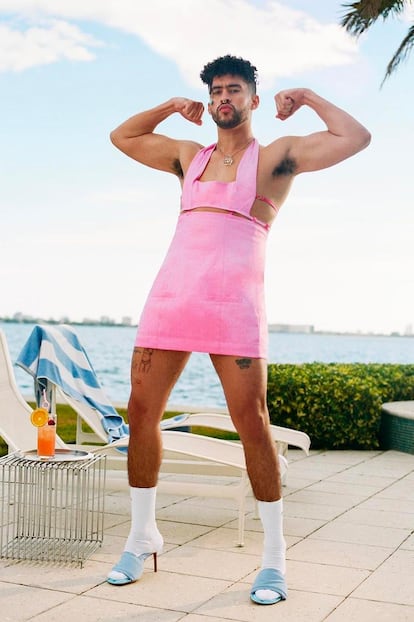Bad Bunny’s secret: from supermarket employee to global pop star in just six years
The Puerto Rican sensation sings in Spanish with a message of inclusion. His success is unprecedented for a reggaeton star

For the last two years, Bad Bunny has been the most streamed musical artist in the world. These days, that makes him the most popular artist on the globe. “He keeps breaking records and climbing skyward, reaching a place reserved for rare, once-in-a-lifetime stars,” wrote Rolling Stone this week, joining dozens of other publications recognizing that, for the first time in history, the number one luminary in world pop is a Latino artist.
It’s hard to deny. The musician from Puerto Rico just filled New York’s Yankee Stadium for two nights in a row, selling 100,000 tickets. During one of those concerts, he received the MTV VMA Award for Artist of the Year, becoming its first non-English speaking winner. “I believed from the beginning that I could become great, that I could become one of the biggest stars in the world without having to change my culture, my language, my jargon. I am Benito Antonio Martínez, from Puerto Rico to the whole world,” he said in his acceptance speech.
To ensure that the VMAs would be unforgettable, the boy who in 2016 worked as a supermarket bagger in Vega Baja, a city half-an-hour from San Juan, kissed one of his male dancers on the mouth onstage during his performance. After dressing in skirts and painting his nails, he publicly broke another taboo in the world of urban music. Pablito Wilson, author of Reggaetón, una Revolución Latina, explains that the genre is generally masculine and conservative. “It is impossible to know why he did it. A kiss has the meaning you want to give it,” says the Argentine journalist. “A straight, cisgender man knows that kissing a male dancer means something important to the LGBTI community. It will be a gesture of solidarity, and it will not take away his manhood. It is also possible that he is discovering bisexuality. What surprises me is that it’s such a scandal. That discussion seems crazy to me,” he says.

Wilson is clear about what makes Bad Bunny stand out. “We are in an age where honesty is rewarded and anything perceived as dishonest is punished. That comes with the Youtubers and the TikTok generation. Bad Bunny had super misogynistic lyrics. He was an irresponsible teenager, as many of us were at the time. And he has allowed himself to be shaped, he has become a more responsible person. I think he was greatly nurtured by his relationship with Gabriela,” he explains.
Gabriela Berlingeri is the rapper’s only publicly known partner since 2017. According to him, Berlingeri helped him become aware of gender issues, to the point that, after winning for Best Latin Artist at the 2020 Billboard Music Awards, the musician used his speech to launch a message in Spanish against sexist violence on American television. “I want to dedicate this award to all women around the world, especially to Latin women and women from Puerto Rico. Without you, neither music nor reggaeton would exist, so enough of sexist violence against women, we are going to educate now in the present for a better future, “said the Puerto Rican after performing his hit “Yo Perreo Sola.”
“He learned about women’s concerns from Gabriela,” continues Wilson. “He knew how to listen, and that brought him to take up certain causes. I think he is a very genuine guy. He adds to all that the fact that he produces. Since he was 12 years old, he has produced a lot of music. He started on SoundCloud and was followed by DJs and producers for a long time. By the time his songs ‘Diles’ and ‘Soy el Peor’ became hits, he was already known in the scene. Image and marketing are also a factor, which doesn’t mean he’s dishonest. A person once told me that the problem is not to build a character, but to build a character that does not reflect who you are,” concludes the journalist.
The person in charge of the marketing behind Bad Bunny is the Puerto Rican businessman Noah Assad, founder of the independent label Rimas. The rapid infiltration of YouTube and streaming services in Latin America has changed the profile of successful artists, now that they are not dependent on record buyers or large radio networks. Trends are set by young people with an internet connection. In 2019, Assad assured Rolling Stone that the beginning of his success came when he met the person who was in charge of expanding YouTube in countries like Puerto Rico and Colombia. “I was able to introduce him to all of these artists that he was a fan of, and before you know it, he came back and said, ‘I’m going to try to bring you a huge opportunity,” he declared to the magazine. That executive gave Rimas the first YouTube direct monetization deal in Puerto Rico.
Little was known about Rimas’ capital until, in early August, Assad’s former partner filed a complaint to claim half of his assets, which he values at $1 billion, of which half comes from the label’s relationship with Bad Bunny. The detailed document states that Rimas was founded in 2014 with $2 million contributed by a former deputy minister in the government of the late Hugo Chávez of Venezuela who is now a Miami resident and the true owner of the label.

What is clear is that Assad and Benito created Bad Bunny together. “Noah Assad has the label and gets to work with him. And the idea was to do things differently, to look at it from another angle,” explains Wilson. “I imagine it was like: What do you want to project? How are we going to do it? We are in an era where a lot of people are coming out independently or without labels, TV channels or mainstream media. People are breaking in differently. They are still there. Right now Bad Bunny will already be working on the next album, and thinking: ‘What are we going to do? What are we going to build here?’”
The method worked. In November 2020, his third album, El Último Tour Del Mundo, was the first work completely in Spanish to debut at the top of the Billboard 200 list. It was also his first number one in the United States, two years after the Korean group BTS managed to reach the same position. Looking at the two cases, the conclusion is clear: the epicenter of pop has shifted from the English-speaking countries to those areas of the globe long considered the peripheries. Since 2021, BTS and Bad Bunny have shared a label, The Orchard, a Sony subsidiary specializing in online music distribution.
Along the way, the same kid has become a style icon. Just this week, Mr Porter, the world’s leading luxury menswear website, named him one of the best-dressed men in the world. He has previously participated in campaigns such as Jacquemus, in which he wore a woman’s dress, and he enjoys unusual prestige among brands.
The musician has rubbed shoulders with movie stars like Brad Pitt as part of the cast of Bullet Train, in which he plays an assassin. The reaction to the movie was so good even before the premiere that the studio, Sony Pictures, offered Benito his first leading role. He will soon star in El Muerto, a film set in the Spiderman universe. The movie is tailor-made for him, the main character created practically from scratch. El Muerto is the alias of Juan Carlos Sánchez, a Mexican wrestler who faced Spiderman in two issues of the comic in 2006. It will be released in 2024.
Meanwhile Un Verano Sin Ti, his latest album (filled with infallible pop songs and transcending reggaeton), remains the best-selling album in the US. “They made Un Verano Sin Ti from 70 songs, and they sat down to ask, ‘Which ones are suitable for the south of the continent? Which ones work in Colombia? Which ones in Puerto Rico?’” Wilson reflects. “That’s why people like the album so much. It has something for all audiences. We all like the album, but we all like one part more than another. But it is impossible to break down all the factors of Bad Bunny’s success. There are a lot of factors. There is a lot that escapes us.”
Tu suscripción se está usando en otro dispositivo
¿Quieres añadir otro usuario a tu suscripción?
Si continúas leyendo en este dispositivo, no se podrá leer en el otro.
FlechaTu suscripción se está usando en otro dispositivo y solo puedes acceder a EL PAÍS desde un dispositivo a la vez.
Si quieres compartir tu cuenta, cambia tu suscripción a la modalidad Premium, así podrás añadir otro usuario. Cada uno accederá con su propia cuenta de email, lo que os permitirá personalizar vuestra experiencia en EL PAÍS.
¿Tienes una suscripción de empresa? Accede aquí para contratar más cuentas.
En el caso de no saber quién está usando tu cuenta, te recomendamos cambiar tu contraseña aquí.
Si decides continuar compartiendo tu cuenta, este mensaje se mostrará en tu dispositivo y en el de la otra persona que está usando tu cuenta de forma indefinida, afectando a tu experiencia de lectura. Puedes consultar aquí los términos y condiciones de la suscripción digital.








































